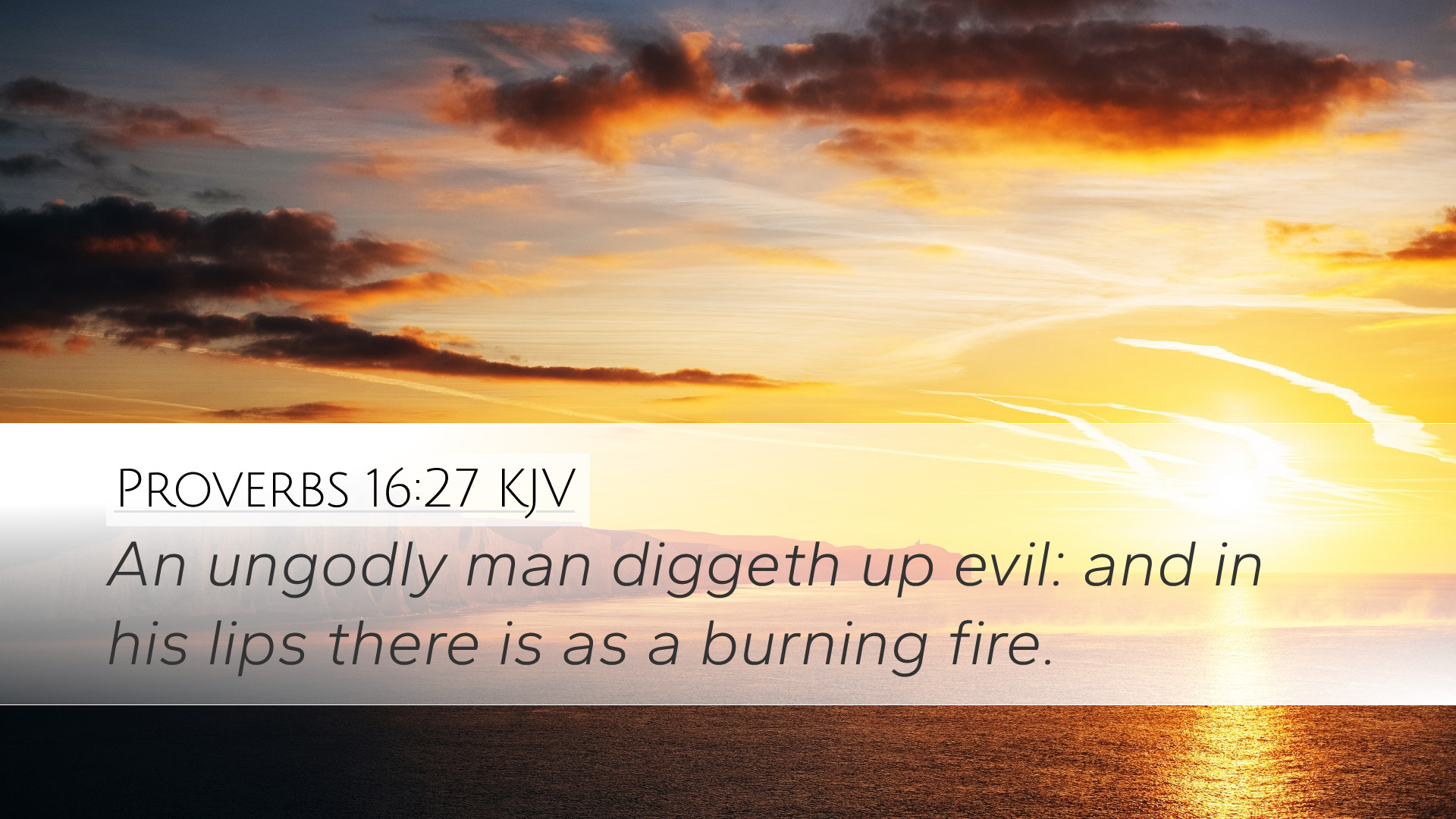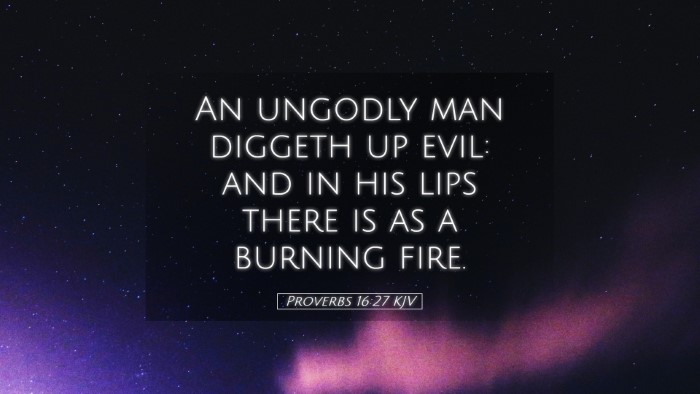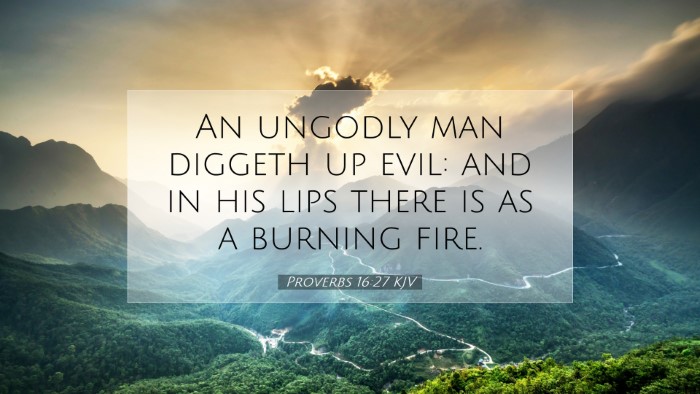Commentary on Proverbs 16:27
Verse: Proverbs 16:27 - "An ungodly man diggeth up evil: and in his lips there is as a burning fire."
Overview
This verse offers a profound insight into the nature of ungodliness and the destructive power of speech. It serves as a warning for both the individual and the community regarding the consequences of evil intentions and words.
1. The Nature of the Ungodly
-
Matthew Henry: Henry explains that the term "ungodly" refers to those who live without reverence for God, suggesting a lifestyle that is marked by wickedness. They are characterized by their search for evil, trying to uncover wrongdoing in others, which reflects a deeper spiritual malaise.
-
Albert Barnes: Barnes emphasizes that the ungodly man is one who is intrinsically bent on finding fault. His actions are not merely superficial; they involve a deeper conscience that revels in the misfortunes of others, highlighting a diabolical essence in their pursuits.
-
Adam Clarke: Clarke postulates that those who are ungodly are often skilled at finding and exposing the weaknesses of others. He notes that this behavior stems from a heart that is full of malice and malcontent, reflecting a corrupt nature.
2. The Digging of Evil
-
Matthew Henry: The imagery of "digging up evil" conveys the idea of laboriously searching for wrongs. This analogy serves to illustrate the effort and intention invested in unearthing and disseminating evil, akin to mining for precious metals but instead finding spiritual corruption.
-
Albert Barnes: Barnes interprets "digging up evil" as an active endeavor. It implies a deliberate choice; ungodly individuals engage in this behavior with clear intent, betraying their moral integrity and leading others into sin through their actions.
-
Adam Clarke: Clarke elaborates that this digging is not without its objectives. The ungodly seek to spread remorse and bitterness, acting as agents of chaos and undesirable influence in society, showing a disinterest in righteousness.
3. The Burning Fire of Words
-
Matthew Henry: Henry draws attention to how the lips of the ungodly are likened to a "burning fire." This metaphor emphasizes the destructive power of their speech, which can destroy relationships, reputations, and lead communities into discord.
-
Albert Barnes: Barnes further explains that the metaphor of fire denotes that words have the power to inflame passions and ignite conflicts. It signifies the necessity of guarding our speech and being aware of the consequences of our words.
-
Adam Clarke: Clarke warns that the 'burning fire' indicates not just that their words harm, but that they consume and devastate. He states that unchecked speech can lead to explosive outcomes, fostering divisions and animosities among people.
4. The Theological Implications
The theological significance of this verse extends beyond mere observation of human behavior. It challenges readers to reflect on their inner motives and the impact of their words on others. The nature of ungodliness here presented is contrasted with the righteousness that should characterize a believer.
-
Matthew Henry: From a theological standpoint, Henry encourages self-examination among believers. They are called to root out evil from their own hearts rather than unearthing it in others, thereby promoting a culture of grace instead of judgment.
-
Albert Barnes: Barnes underlines the urgent need for prayer and discernment in believers’ lives, suggesting that individuals must rely on God's wisdom to manage their interactions and safeguard against the tempting nature of ungodly speech.
-
Adam Clarke: Clarke articulates that the very act of speaking can either build or destroy. Theologically, he posits that believers should strive to embody the love of God in their dialogue, ensuring that their words reaffirm and edify others rather than leading them into sin.
5. The Ethical Challenge
This passage presents a dual ethical challenge: the individual must guard their own heart and mouth while also actively encouraging righteousness in others.
-
Matthew Henry: Henry concludes that Christians must reject the ungodly behavior depicted in this verse. Instead, they should cultivate an environment where truth prevails, thereby reflecting God's righteousness in their communities.
-
Albert Barnes: Barnes advocates teaching and encouraging others to refrain from ungodly speech, modeling it instead through our own integrity and commitment to godliness, reiterating the principle of being an agent of peace in a world rife with chaos.
-
Adam Clarke: Clarke's ethical concern emphasizes the power of personal influence. He encourages individuals to be aware that they play a significant role in either fostering an atmosphere of love and understanding or contributing to a landscape marred by hostility.
Conclusion
Proverbs 16:27 serves as both a caution and a call to action for believers. As they navigate their daily lives, each must be vigilant regarding the influence of ungodly actions and speech. By seeking righteousness and embracing a spirit of grace, believers can counteract the destructive forces of society and contribute to a more loving and harmonious community.


